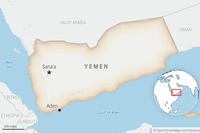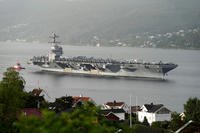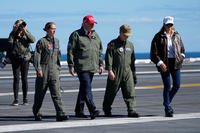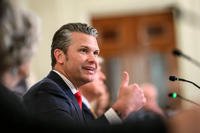The Defense Department is on the verge of naming military bases to house the overflow of children taken into custody at the Mexican border as civilian shelters reach capacity.
The DoD has yet to receive formal requests from the Department of Health and Human Services.
"I can tell you that we are very open to providing facilities and working closely with them to ensure that their needs are met," Dana White, the DoD's chief spokesperson, said at a Pentagon briefing Thursday.
White said last month that the DoD was awaiting a site survey by HHS to designate additional shelters, to include military bases. According to HHS, there are currently about 100 civilian shelters for Unaccompanied Alien Children in 14 states.
In a similar surge at the border in 2014, a total of more than 7,000 children were housed temporarily at the Army's Fort Sill in Oklahoma, Lackland Air Force Base in Texas, and Naval Base Ventura in California.
The most recent site survey by HHS included officials going to four bases in Texas and Arkansas. The bases were Dyess Air Force Base in Abilene, Texas; Goodfellow Air Force Base in San Angelo, Texas; the Army's Fort Bliss in El Paso, Texas; and Little Rock Air Force Base in Arkansas, ABC reported.
The consideration of the military bases to shelter children taken into custody at the border by Customs and Border Protection was prompted by a surge of about 20 percent in the number of children at shelters in May.
HHS reported Tuesday that 10,773 migrant children were in custody at the end of May, compared to 8,886 on April 29, a result of President Donald Trump's "zero tolerance" policy on illegal immigration outlined in April by Attorney General Jeff Sessions and Homeland Security Secretary Kirstjen Nielsen.
Under the policy, adults crossing illegally face criminal prosecution and can be held in federal jails. Minors under the age of 18 cannot be prosecuted or put in federal detention under U.S. law.
The HHS statistics on children do not break down into minors taken into custody as they crossed the border unaccompanied or those who were separated from their parents as they crossed.
However, at a hearing of the Senate Subcommittee on Border Security and Immigration last week, Customs officials said that 638 adults were referred for criminal prosecution between May 6 and May 19, and those 638 adults had a total of 658 children with them.
On Tuesday, HHS officials pushed back on reports that the department had lost track of more than 1,400 children who were released to the custody of relatives or sponsors.
In a statement, HHS Deputy Secretary Eric Hargan said, "The assertion that unaccompanied alien children are 'lost' is completely false."
He said that "lost children" stories resulted when HHS was unable to contact sponsors or relatives with follow-up calls on the status of the children.
"These children are not 'lost.' Their sponsors -- who are usually parents or family members and in all cases have been vetted for criminality and ability to provide for them -- simply did not respond or could not be reached when this voluntary call was made," Hargan said.
"While there are many possible reasons for this, in many cases, sponsors cannot be reached because they themselves are illegal aliens and do not want to be reached by federal authorities," he said.
"The Unaccompanied Alien Children Program is being abused," said Steven Wagner, acting assistant secretary for the Administration for Children and Families at HHS. "It was never intended to be a foster care system with more than 10,000 children in custody at an immediate cost to the federal taxpayer of $1 billion per year."
-- Richard Sisk can be reached at Richard.Sisk@Military.com.












